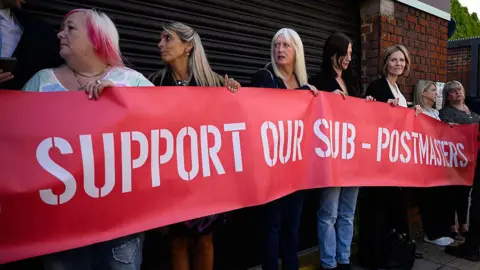Tom Espiner
BBC business reporter
Reporting fromThe Oval, London

 Getty Images
Getty Images
People affected by the Horizon scandal gathered outside the Oval in London on Tuesday where the report was announced
The first report on the findings from an inquiry into the Post Office Horizon IT scandal has been published.
It reveals for the first time the full extent of the suffering of sub-postmasters and others who were affected by being wrongly accused of stealing money and false accounting, based on incorrect data.
Here are five things we now know as a result.
1. Impact on lives was 'disastrous'
The inquiry heard many harrowing experiences from sub-postmasters who were incorrectly accused of theft and false accounting.
The report outlines how the scale of suffering was even greater than thought until now.
There had already been stories of two sub-postmasters taking their own lives due to the Horizon scandal – Michael Mann and Martin Griffiths.
Now we know that more than 13 people may have taken their own lives due to the scandal.
Families have said that six sub-postmasters and seven people who were not sub-postmasters killed themselves, after Horizon showed "illusory" shortfalls in branch accounts.
Apart from this, at least 59 people told the inquiry they had contemplated suicide at various points, of whom 10 attempted to take their own lives.
One sub-postmaster told the inquiry: "The mental stress was so great for me that I had a mental breakdown and turned to alcohol as I sunk further into depression. I attempted suicide on several occasions and was admitted to mental health institutions twice."
In the report, inquiry chair Sir Wyn Williams described the impact on those affected as "disastrous", and said it was not easy to "exaggerate the trauma" that people went through being investigated and prosecuted.
Many sub-postmasters gave evidence of psychiatric and psychological problems that have "dogged them" and are still ongoing.
- If you have been affected by the issues in this story the BBC Action Line features a list of organisations which are ready to provide support and advice.
2. Post Office knew its IT system had errors
A recurring question throughout the inquiry was: how much did the Post Office know that the Horizon data it was using to prosecute people was not accurate?
Sir Wyn is very robust in his initial response and says there will be more on this in the next volume of the report.
He says that senior and not so senior people in the Post Office "knew, or at the very least should have known, that legacy Horizon was capable of error" – legacy Horizon was the version in use until 2010.
"Yet, for all practical purposes, throughout the lifetime of legacy Horizon, the Post Office maintained the fiction that its data was always accurate."
After 2010, the next version of Horizon also contained "bugs, errors and defects".
Sir Wyn says: "I am satisfied that a number of employees of Fujitsu and the Post Office knew that this was so."
3. Post Office and Fujitsu behaved unacceptably
The report says many hundreds of people were wrongly convicted of criminal offences, and thousands were held responsible for losses that were illusory.
Just a reminder of the numbers: about 1,000 people were prosecuted, and only between 50 and 60 were not convicted.
Thousands of employees were suspended, and many later had their contracts terminated.
These people were victims of "wholly unacceptable behaviour" by individuals employed or associated with the Post Office and Fujitsu, and from time to time by the organisations themselves, Sir Wyn says.
4. Post Office was too adversarial on compensation
There have been a number of settlements and compensation schemes for sub-postmasters. While some have been satisfied by the level of compensation available, many who had more complex claims were not.
Sir Wyn says three of the compensation schemes have been "bedevilled with unjustifiable delays" and redress has not been delivered promptly.
Moreover, with difficult and substantial claims, "on too many occasions" the Post Office and its legal advisers had been "unnecessarily adversarial" in making initial offers for compensation, driving down the level of eventual financial settlements.
Sir Wyn recommends three things when it comes to compensation:
- A mechanism to deliver redress "to persons who have been wronged by public bodies", should be established
- Free legal advice should be extended to claimants on one of the schemes – the Horizon Shortfall Scheme.
- Close family members of people who have "been most adversely affected by Horizon" should be compensated
Sir Wyn estimates that there are currently 10,000 eligible claimants in three compensation schemes, and that number is likely to rise by at least hundreds, if not more.
5. Post Office and Fujitsu told to meet victims
In addition, by 31 October this year the report says the government, Fujitsu and the Post Office should publish a report on a programme for restorative justice.
This is where people who have caused harm should be brought together with people who have suffered it "so they can discuss the impact, take responsibility, and work collaboratively to make amends".
Sir Wyn is calling on the government to consider his recommendations without delay.
.png)
 5 months ago
16
5 months ago
16








 English (US) ·
English (US) ·